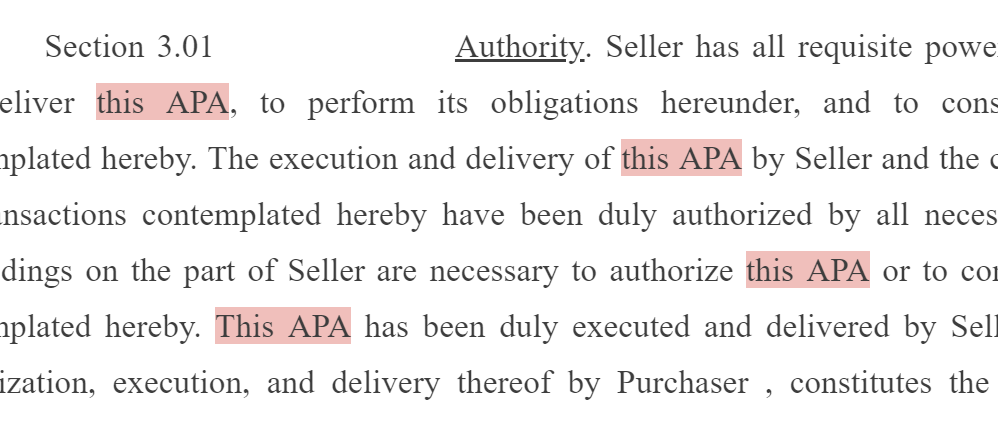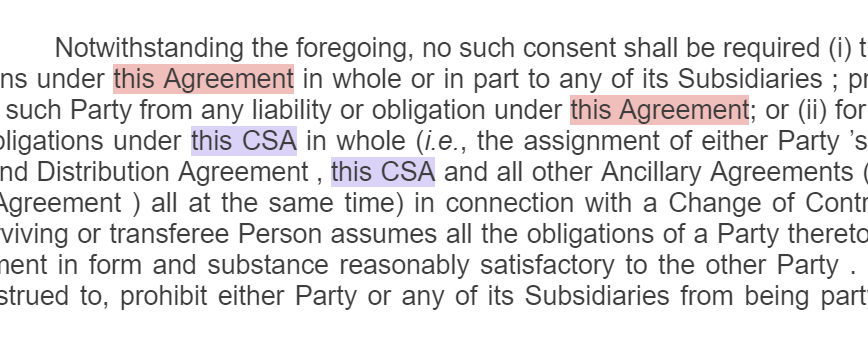Here’s something I tweeted this week:
Tonight's question: What acronym have you seen used in a contract as the defined term for that contract? Off the top of my head, I recall having seen NDA, MSA, and CRADA. (I'm not endorsing this practice!)
— Ken Adams (@AdamsDrafting) September 22, 2020
Here are the examples people submitted in response, plus others I found in rooting around on EDGAR:
- APA (asset purchase agreement)
- CA (confidentiality agreement)
- COA (contract operating agreement)
- CRADA (cooperative research and development agreement)
- CSA (consulting agreement)
- CSA (colocation services agreement)
- CSA (clinical supply agreement)
- CSA (commercial supply agreement)
- DPA (data processing agreement)
- ESA (equipment supply agreement)
- IA (implementation agreement)
- JOA (joint operating agreement)
- LOC (letter of credit)
- LOI (letter of intent)
- LUA (lock up agreement)
- MFA (master frame agreement)
- MLSA (master license and services agreement)
- MPA (master purchasing agreement)
- MSA (master service agreement)
- NDA (nondisclosure agreement)
- OGML (oil, gas, and mineral lease)
- PDA (project development agreement)
- PSA (purchase and sale agreement)
- SHA (shareholder agreement)
- SLA (service level agreement)
- STA (share transfer agreement)
In my tweet (and in the first version of this post) it would have made more sense to use the word initialism, not acronym. Acronyms are read or spoken as a single word, whereas initialisms are sounded letter by letter. In the list above, the only plausible (albeit inelegant) acronym is CRADA. (Thanks for the reminder, Jared Nelson, darn you!)
Using initialisms for a contract’s references to itself is indeed a thing. Here’s just one example:
Now that I’ve established that this practice exists, for the following reasons I recommend you not do the acronym thing:
First, processing acronyms demands more of a reader.
Second, the economies achieved through using an acronym instead of this agreement are laughable.
Third, because this agreement is so entrenched, using an acronym instead can create glitches, whether through copy-and-pasting from other contracts or otherwise. I found several in a few minutes on EDGAR. Here’s an example:
And fourth, using an initialism starts to look a little silly if the same initialism is used for four different kinds of contracts, as is the case with CSA in the list above.
So just stick with this agreement, y’all. And that’s this agreement with a small a—this is the twenty-first century!
But initialisms and acronyms serve a purpose elsewhere. For example, I have no problem with SOW for statement of work. (As I discuss in MSCD, SOW can be used as an initialism or as an acronym. Your choice determines whether you use a or an as the indefinite article with SOW. Thrilling!)



About your comment to use “this agreement”, I have tried and tried. I deleted the definition of “Agreement” or “Amendment” from our templates, but I got overruled and the committee put back in “Agreement” and “Amendment” even though what else could one be referring to if one uses “this Agreement” (or “this agreement”)? Opposing counsel often re-insert the definition of “Agreement” even if I remove it. So, I have given up the fight. Sorry. :-)
I feel your pain. I’m a cussed sort, so I’d continue trying, each time asking whoever it is to offer a rational explanation and responding with a raised eyebrow or guffaws (as appropriate) when they fail.
1/ Rich B: If you’ve lost the fight, have some fun: push for a defined short name: ‘this Agreement (TA)’, enabling ‘under TA section 22’ or ‘under section 22 of TA’.
2/ The acronym/initialism distinction is either not yet rock-hard or if it is, has exceptions. People say ‘eff bee eye’ even when it is written ‘FBI’, not ‘F.B.I.’ Ditto ‘BBC’.
3/ I lean against acronyms and initialisms in contracts. For example, I would short-name the Associated Society of Locomotive Engineers and Firemen (a union) ‘the Society’ rather than ‘ASLEF’ (pronounced ‘azleff’). Acronyms and initialisms weary the reader. But the preference is not a rule: I’d probably make ‘BBC’ the short-name defined term, not ‘the Beeb’ or ‘the Corporation’. –Wright